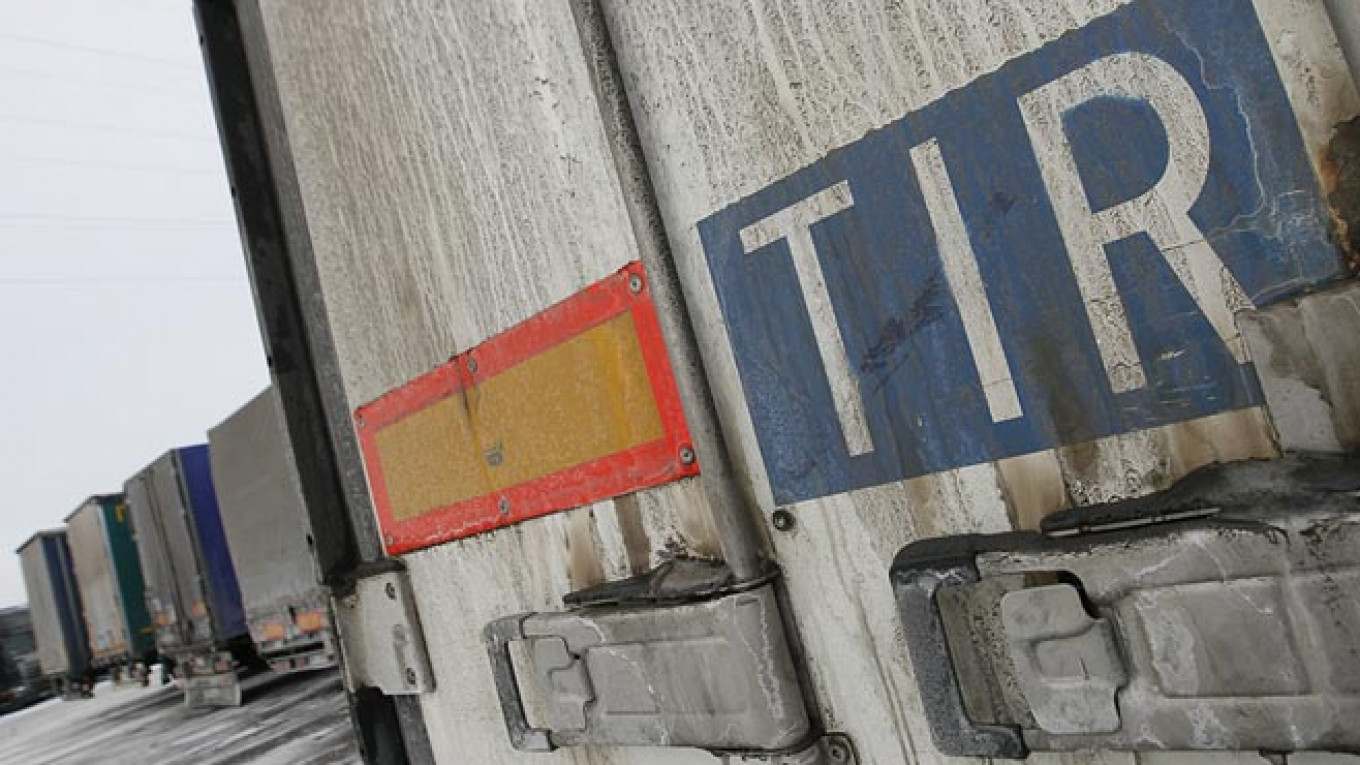Russia’s withdrawal from the TIR international customs convention will cost carriers more than $2.5 billion in overhead payments per year, the International Road Transport Union representatives said Wednesday.
The Federal Customs Service published a letter in June saying it would pull out of the TIR system starting Aug. 14, blaming it for repeated cases of tax payment violations that resulted in debt exceeding 20 billion rubles ($560 million). The agency later postponed the decision for one month after it was subjected to pressure from professional business organizations.
In October the custom service’s claims were ruled groundless by Russia’s Supreme Commercial Court. Nevertheless, the customs service started to close down regions to TIR operations, beginning with Siberia and the Far East and then spreading the practice across the country. The TIR system has now been revoked in 95 percent of Russia.
“Now the trucks insured by TIR can only enter Russia on the border with Finland and with Belarus, making European carriers adjust routes and travel 10 to 15 percent extra miles, which pushes up overheads,” said Kseniya Kliko, the head of law department at the International Road Transport Union.
The TIR system, recognized in 68 countries in the world by its blue-and-white tag on truck windscreens, was established by a United Nations Convention in 1975. It allows goods carried by car or truck, if sealed in the country of origin, to only pass through customs again at the point of destination, transiting as many countries as necessary.
The system is backed by the International Road Transport Union, or IRU, which insures the risks of taxes not being paid if the goods are not delivered to their destination. According to the union, more than 40 percent of Russia’s imports came in by trucks insured under TIR before the Federal Customs Service started to pull out of the system.
If the agency proceeds to fully exit from the TIR convention, it would mean that all carriers would be required to have a national customs guarantee in addition to international guarantees they are also obliged to carry.
According to the IRU, the cost for a truck to pass customs has already risen fivefold at some border crossings for operations terminating in Russia, and will grow even more for transit.
“Currently, prices for customs procedures vary greatly depending on the point of entrance and could range from 3,500 to 93,000 rubles for one shipment,” Kliko said. By comparison, a TIR insurance costs $60 and does not require any additional payments on the border.
In October, following the customs service’s decision to exit the TIR, First Deputy Prime Minister Igor Shuvalov said that countries in the Customs Union would develop their own transit insurance system.
Such a system has not yet been created, leaving countries like Kazakhstan, which does not have its own border with Europe or direct access to sea ports, in trade isolation.
Russia’s exit would put a limit to his country’s international trade, said Teodor Kaplan, Secretary General at Association of International Road Carriers of Kazakhstan.
Contact the author at [email protected]
A Message from The Moscow Times:
Dear readers,
We are facing unprecedented challenges. Russia's Prosecutor General's Office has designated The Moscow Times as an "undesirable" organization, criminalizing our work and putting our staff at risk of prosecution. This follows our earlier unjust labeling as a "foreign agent."
These actions are direct attempts to silence independent journalism in Russia. The authorities claim our work "discredits the decisions of the Russian leadership." We see things differently: we strive to provide accurate, unbiased reporting on Russia.
We, the journalists of The Moscow Times, refuse to be silenced. But to continue our work, we need your help.
Your support, no matter how small, makes a world of difference. If you can, please support us monthly starting from just $2. It's quick to set up, and every contribution makes a significant impact.
By supporting The Moscow Times, you're defending open, independent journalism in the face of repression. Thank you for standing with us.
Remind me later.






